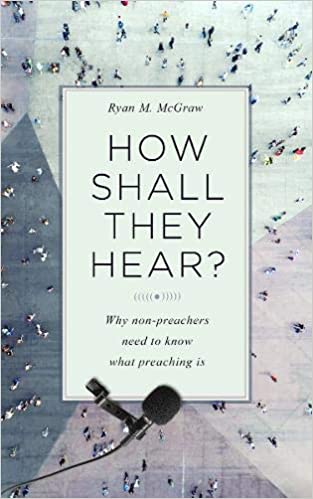
Ryan M. McGraw
Reviewed by: Lowell Ivey
How Shall They Hear? Why Non-Preachers Need to Know What Preaching Is, by Ryan M. McGraw. Evangelical Press, 2019. Paperback, 150 pages, $10.99 (Amazon). Reviewed by OP pastor Lowell Ivey.
What if you could find one book that concisely and clearly explains what preaching is, what it should accomplish, how it ought to be done, and why it matters so much? And what if that book were written mainly for the hearers rather than the preachers of sermons? This book was written to equip ordinary Christians to hear the voice of Christ in preaching and, hearing him, to love and follow him more faithfully, by the grace of God.
McGraw’s approach is to unfold what the Bible itself says about preaching. He does so in chapters 1–6 by developing six passages of Scripture that help the reader discover what preaching is (2 Cor. 5:20–6:2), why it is necessary (Rom. 10:14–17), how it should be done (1 Cor. 2:1–5), what are its general aims (Col. 1:28–29), what are its aims in relation to the person and work of Christ (John 16:8–11, 14–15), and how preaching relates to the work of the Trinity (John 4:21–24). This last point is classic McGraw. He reminds us that preaching can only be Christocentric as it is Trinitarian. The ultimate goal of preaching is to bring redeemed sinners into the worship of the Father, through the person and work of the Son, by the powerful ministry of the Spirit, through the revelation of the Word (46).
Chapters 7–10 address the question of methodology in preaching. Here McGraw carefully balances the need to hear Christ preached exegetically, redemptive-historically, theologically, and devotionally. Acknowledging that preaching is best learned by example, McGraw illustrates his preaching principles from several biblical passages and preachers (chapters 10–11). A chapter on sermon application (chapter 12) emphasizes both the purpose and nature of biblical application. Application “should direct people to respond in specific ways to the work of the Triune God in redemption.” It should be “direct, pointed, specific, searching, and it should address many kinds of hearers” (86). The two concluding chapters address how every Christian is involved in preaching, even far more than they may realize (chapter 13), and what to do if we find ourselves under preaching that we think is deficient (chapter 14). An appendix on following sermon structures fits with the overall purpose of the book, and the bibliography, for such a short book, is thorough and useful.
My only complaint about this book is that some of the pages fell out during my first read, due to poor binding issues.
As a preacher, I came away edified, sharpened, and better equipped to help God’s people benefit from the chief means of grace. This is a book to have on the free literature table in the foyer of your church.
March 30, 2025
On the Trail with a Missionary
March 23, 2025
Midnight Mercies: Walking with God Through Depression in Motherhood
March 16, 2025
March 09, 2025
Zwingli the Pastor: A Life in Conflict
March 02, 2025
February 23, 2025
African Heroes: Discovering Our Christian Heritage
February 16, 2025
© 2025 The Orthodox Presbyterian Church